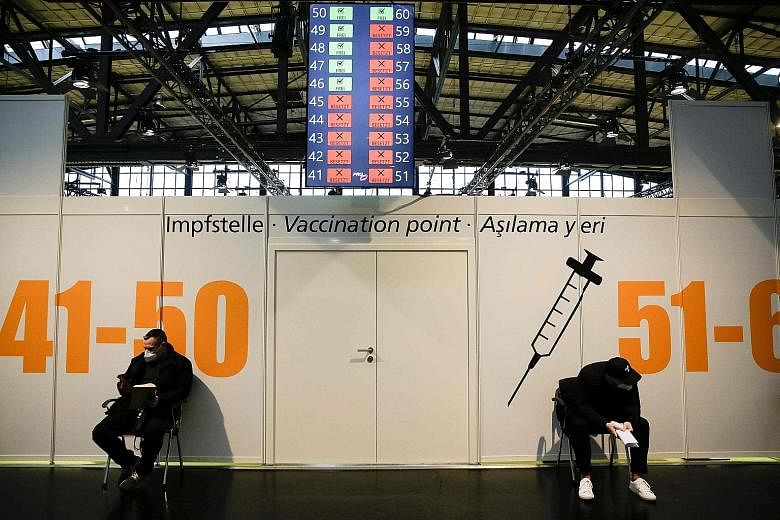FRANKFURT • Germany's coronavirus vaccination campaign faced delays in several cities after temperature trackers showed about 1,000 of the shots made by BioNTech and Pfizer might not have been kept cold enough during transit.
"When reading the temperature loggers that were enclosed in the cool boxes, doubts arose about the compliance with the cold chain requirements," the district of Lichtenfels in the north of Germany's largest state Bavaria said in a statement.
Medical staff found that the temperature in one vaccine transport cool box had risen to 15 deg C, a spokesman for Lichtenfels said, above the maximum of 8 deg C stipulated by the manufacturers. He added that his district had not received advice from BioNTech yet on how to proceed.
The regional government of Bavaria's Upper Franconia region, where several affected districts are based, said that BioNTech cleared the vaccines late on Sunday.
"BioNTech has confirmed the quality of the vaccine shots," a spokesman for Upper Franconia said. "The vaccination programme can start (in our region)."
BioNTech had earlier said in a statement that it was responsible for the shipment to the 25 German distribution centres, and that the federal states and local authorities were responsible for the shipment to the vaccination centres and the mobile vaccination teams.
"This is where the variations in temperature occurred. We are in contact with many authorities to provide advice. However, it is up to them how to proceed," a BioNTech spokesman said.
In a presentation this month, BioNTech had said that once removed from the freezer, the vaccine can be stored for up to five days at between 2 deg C and 8 deg C and up to two hours at temperatures up to 30 deg C, prior to use.
The vaccine, which uses new so-called mRNA technology, must be stored at ultra-low temperatures of about minus 70 deg C before being shipped to distribution centres in specially designed cool boxes filled with dry ice.
The European Union launched a mass Covid-19 vaccination drive on Sunday, with pensioners and medics lining up to get the first shots.
The delays in Germany highlight the challenge in rolling out the vaccine.
Pfizer postponed the delivery of its vaccine to eight European nations, including Spain, the Spanish Health Ministry said yesterday.
The Spanish branch of Pfizer informed Madrid on Sunday night of the delay in shipments to the eight nations due to a "problem in the loading and shipment process" at its plant in Belgium, the ministry said in a statement. It did not specify which European nations, aside from Spain, were affected.
Pfizer has informed the ministry that the problem "was already resolved" but the next delivery of vaccines "will be a few hours late" and arrive in Spain today, a day later than expected, the statement said.
Asked about the delay at an interview with Ser radio, Health Minister Salvador Illa said it was due to a problem "linked to the control of the temperature" of the shipments that was "apparently fixed".
REUTERS

